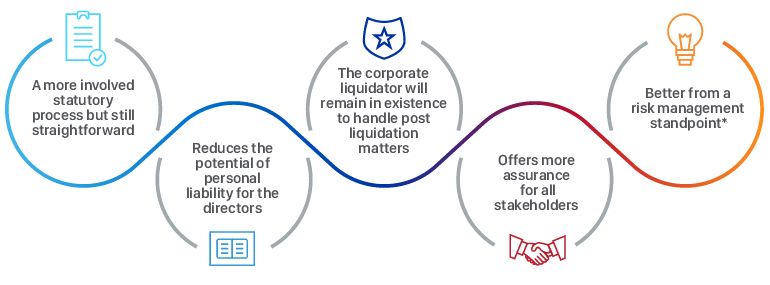The well-established liquidation procedure in the Netherlands provides a formal statutory dissolution and winding-up process for a solvent Dutch company with limited liability (besloten vennootschap met beperkte aansprakelijkheid (BV)). An effective liquidation process is critical to ensuring that creditors of the company are paid, while maximising returns to shareholders, as well as preventing any potential personal liabilities for company directors which otherwise may arise.
With local service providers typically reluctant to accept liquidation engagements, the role and responsibilities of the liquidator is generally undertaken by the former directors of the company. Due to the specialist knowledge and experience required in relation to the liquidation process and greater desire for objectivity and transparency in the performance of these duties, there has been increasing demand for liquidations to be conducted by an independent third party.
Against this backdrop, the Maples Group has established a designated corporate liquidation vehicle which is able to act as liquidator to such companies. The appointment of a specialist third party to support the liquidation process ensures that the wind down of an entity will be handled objectively, transparently and in accordance with all local statutory requirements.
In addition to the removal of personal liability for the directors of the liquidated entity, a further benefit for clients is the fact that the liquidator will remain in existence well after the company has been wound up. It can therefore be re-appointed in the event that the liquidation is re-opened by the Court due to further assets being located or where a creditor or beneficiary has not yet been taken into account.
Without the formal appointment of a liquidator in the Netherlands, a company will enter the Turbo Liquidation process, which is similar to a 'strike-off' in other jurisdictions, raising potential personal liability issues for directors. Where a company has no assets or liabilities at the time of liquidation, there will be no winding-up process and liquidators are not required. The Management Board will file the liquidation with the Trade Register of the Chamber of Commerce and the company's books and records must remain stored with the custodian for a period of seven years. During this period, directors of the company are potentially personally liable for hidden debts and liabilities of the company.
Benefits of Appointing a Third Party, Corporate Liquidator

The Maples Group has a dedicated voluntary liquidation team with experienced professionals backed by an extensive operational and support network. We have developed best practice procedures and enjoy a reputation as a market leader across the jurisdictions in which we operate. With the certainty provided through the formal liquidation process in the Netherlands and our ability to offer this service, an outsourced liquidation solution has been a highly positive experience for our clients.
Significantly, clients benefit from our strong understanding of the local statutory requirements, in order to guide and provide advice throughout the process, as well as to anticipate any constraints or issues that may arise and ensure all relevant deadlines are met. For example, as a result of the two-month waiting period for liquidation proposals in the Netherlands, it is important that all such proposals are submitted before the middle of October, in order to avoid unnecessary filings in the New Year. Furthermore, it can be difficult to obtain court extracts and confirmations from the local Chamber of Commerce during the Christmas holiday season. In cases where a liquidation is not finalised before the calendar year end, the company is required to prepare an additional set of financial statements and tax return, before proceeding with the liquidation.
The content of this article is intended to provide a general guide to the subject matter. Specialist advice should be sought about your specific circumstances.


